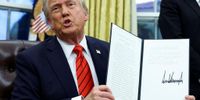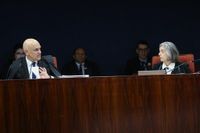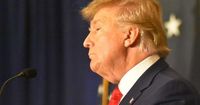On March 25, 2025, President Donald Trump signed a significant executive order that alters the electoral rules in the United States, mandating proof of American citizenship for voters. This initiative aims to fortify the electoral process against foreign interference and enhance the overall security of elections, a move that has sparked considerable discussion across political lines.
The executive order explicitly cites Brazil as a positive example in implementing robust security measures in its electoral system, particularly through the use of biometric identification. According to the document, "India and Brazil, for example, are linking voter identification to a biometric database, while the United States relies heavily on self-declaration of citizenship." This comparison has drawn attention to the differing approaches to electoral integrity between the U.S. and these countries.
Trump's order allows federal agencies, including the Departments of Homeland Security, State, and the Social Security Administration, to provide states access to federal databases to verify the citizenship of voters. The executive order also emphasizes the necessity of confirming citizenship with valid documentation, such as an American passport, a state-issued ID, or military identification.
During a recent session of Brazil's Supreme Federal Court (STF), just hours after Trump’s announcement, Justices Alexandre de Moraes and Cármen Lúcia highlighted the significance of this recognition from the U.S. President. Moraes remarked on the irony of Trump praising Brazil's electoral system while Bolsonaro's supporters have frequently criticized the integrity of electronic voting machines in Brazil. He stated, "The Brazil cited expressly as a model of success by President Donald Trump, while here in Brazil there has been all this preparation to cast doubt on electronic ballot boxes."
Cármen Lúcia echoed this sentiment, noting that the praise from Trump underscored the effectiveness of Brazil's electoral system. She mentioned, "Yesterday, merit was recognized in the United States for the Brazilian system." This acknowledgment comes amidst ongoing legal challenges faced by former President Jair Bolsonaro, who is currently on trial for alleged attempts to undermine Brazil's democratic institutions.
The Brazilian electoral system, which employs biometric technology for voter identification, has been in place since 2008 and currently encompasses over 85% of the electorate. Voters are required to register their biometric data, including fingerprints, photographs, and signatures, at electoral zones. During elections, ballot boxes equipped with biometric systems verify the voter's identity through their fingerprints. If the fingerprints match, the system allows the voter to cast their ballot; if not, the voter is denied access to the voting process.
Trump’s executive order comes in the wake of his claims regarding electoral fraud in the 2020 presidential election, where he alleged that illegal voting diluted the votes of legal American citizens. The new rules aim to prevent such occurrences, asserting that "without the proper enforcement of federal laws, illegal voting, discrimination, fraud, and other forms of misconduct dilute the votes of legal American citizens."
In a broader context, the order also criticizes the practice of mail-in voting in the U.S., suggesting that countries like Denmark and Sweden have implemented stricter regulations regarding this method. The decree specifies that federal funds will be withheld from states that do not comply with the new requirements, reinforcing the administration's commitment to ensuring electoral integrity.
As the political landscape continues to evolve, Trump's endorsement of Brazil's electoral practices presents a curious contradiction. Bolsonaro and his supporters have been vocal critics of Brazil's electronic voting system, frequently questioning its reliability without substantiated evidence. This paradox raises questions about the future of electoral reform in both nations and how they might learn from each other’s practices.
While the U.S. government emphasizes the need for stricter voter identification measures, the Brazilian experience shows that implementing technology can enhance security and efficiency in elections. As the debate continues, both countries may find valuable lessons in each other's electoral systems.
In conclusion, the recent executive order signed by Trump not only alters the electoral landscape in the United States but also highlights the complexities of international electoral practices. With Brazil being cited as a model for security, the implications of this recognition could influence future discussions on electoral integrity, both domestically and abroad.




